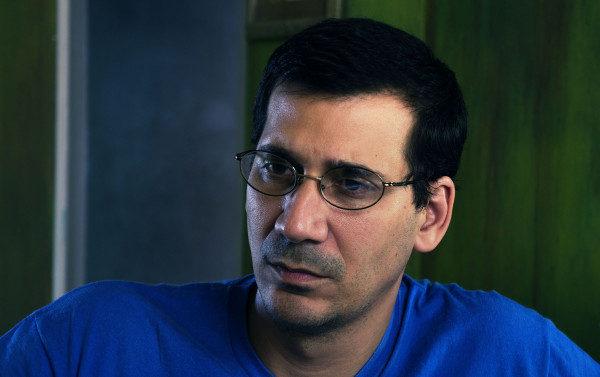

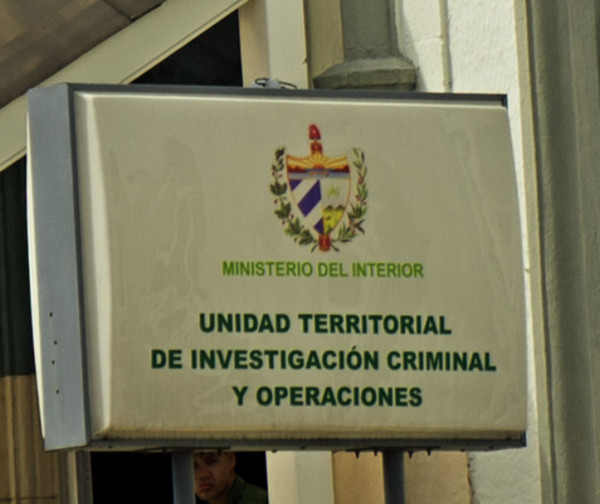
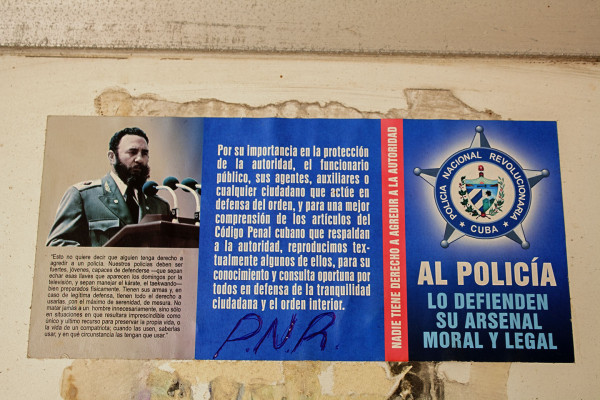

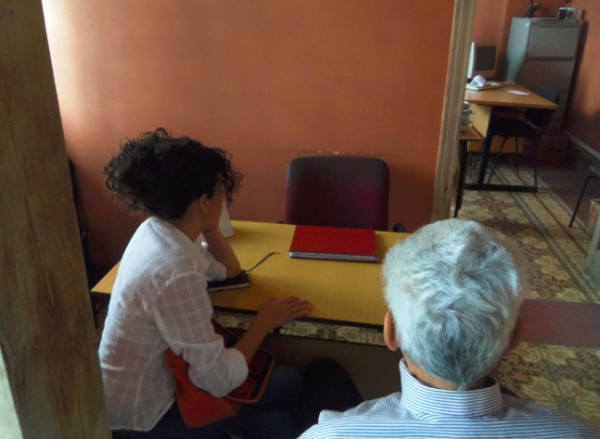
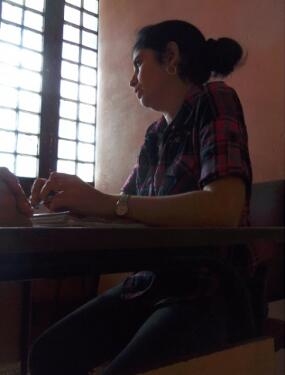
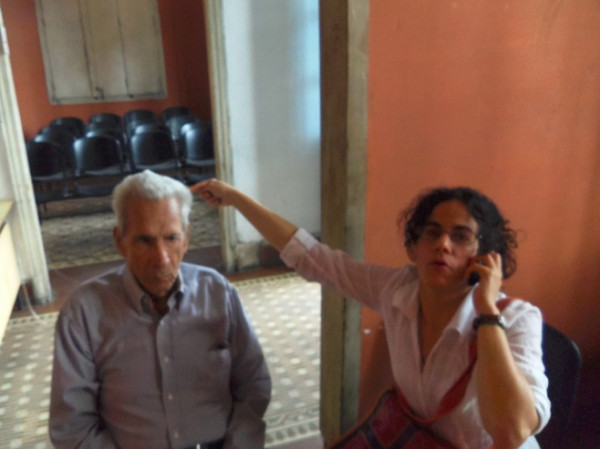
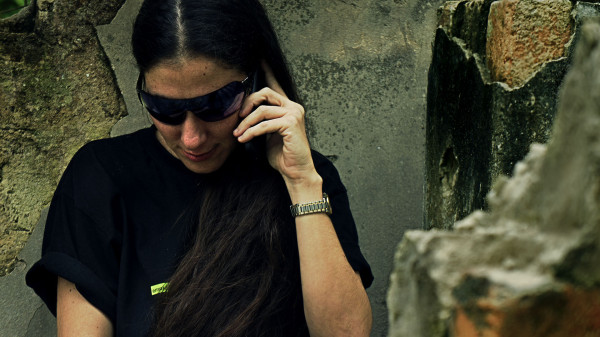
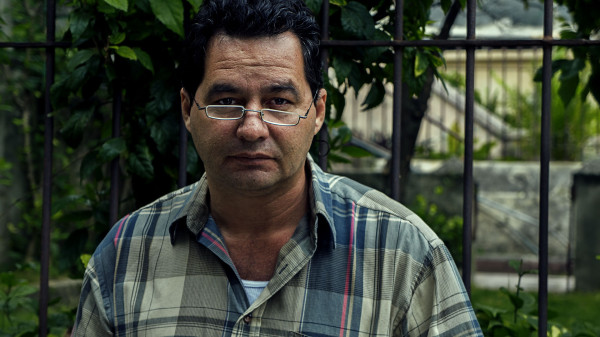
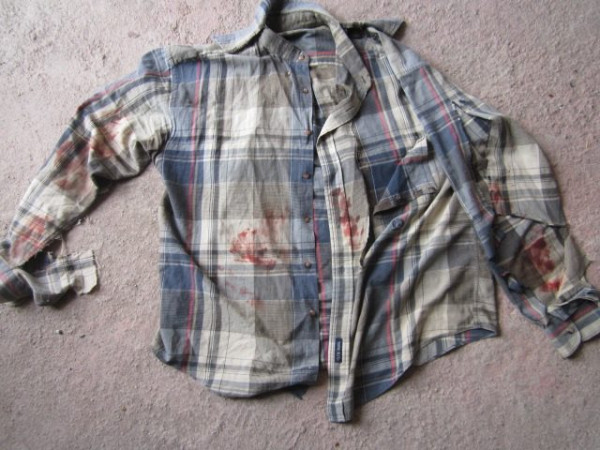
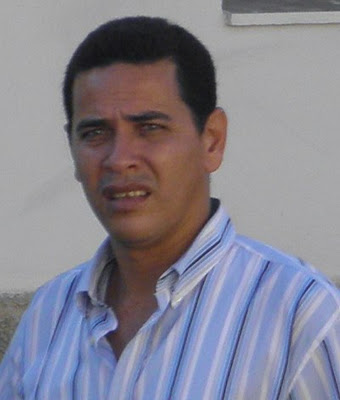


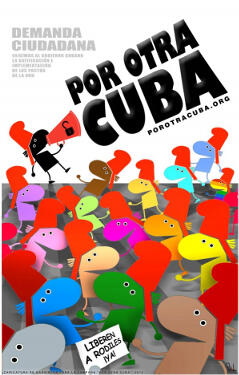
English Translations of Cubans Writing From the Island















 A few months ago, in a post about Puerto Rico, I wrote that in November, in a plebiscite to be held, we would know what Puerto Ricans now think about their political status. The results of the constitutional inquiry show that most citizens were in favor of changing the current status of the Commonwealth and becoming the 51st state of the Union.
A few months ago, in a post about Puerto Rico, I wrote that in November, in a plebiscite to be held, we would know what Puerto Ricans now think about their political status. The results of the constitutional inquiry show that most citizens were in favor of changing the current status of the Commonwealth and becoming the 51st state of the Union.
According to data released by the Election Commission, the 53.99% voted to end the current status and 46.01% voted to keep it. In addition, 61.15% voted for statehood in the United States, 33.31% for continuing as the Commonwealth and 5.53% for independence.
For the first time in history annexation to the U.S. received the highest number of votes. In previous consultations, 1967, 1993 and 1998 the Commonwealth option had won. It seems that now, more than ever, the independence option is not of interest to Puerto Ricans. Indeed, in the recent elections, the independence won only 2.6% of the votes.
It now rests with the Congress of the United States, in line with the provisions of Article IV of the Constitution, to determine their acceptance as the 51st state, as Congress decides which areas are incorporated into the Union.
I think that the Cuban authorities as well as those other ALBA countries, looking at this demonstration of the democratic will of the majority of Puerto Ricans will stop interfering in the internal affairs of the island and withdraw their absurd demands for its independence, raised in international bodies, and will cease to call it a colony.
It seems that Puerto Ricans, intelligently, without losing their Latin American identify, prefer to be full U.S. citizens. In short, since 1917, they have enjoyed this citizenship and have not suffered coups, fratricidal conflicts, revolutions and dictatorships, common in other countries in Latin America.
November 10 2012

Year after year the issue of the U.S. embargo against Cuba is presented in the United Nations. Year after year, the majority of countries votes against this fossil of the Cold War. But even though the existence of such economic sanctions has been condemned 21 times, they remain in force. On both sides of the Florida Straits there are too many interests who want to perpetuate the situation, even though the political discourse says otherwise.
On one side are the many who believe that financially strangling the Cuban government will produce democratic change in Cuba. These are the people who hold the view of the “pressure cooker” on which they just have to put greater and greater pressure until it explodes. For these defenders of the embargo, if daily life on the island becomes ever more miserable due to lack of material goods, Cubans will finally throw themselves into the streets to overthrow the current system. This theory has demonstrated its failure over five decades. What has actually happened is that when the economy hits bottom, people prefer to escape from the Island, legally or illegally – in some cases to literally throw themselves into the sea – rather than confront the powers-that-be.
The others who dream of continuing the embargo are all those ideologues of the Cuban government who have run out of arguments to explain the dysfunction of this system. They are those who need, as in a child’s fairy tale, a big bad wolf to blame for everything. They say it is because of the “blockade” that we can’t enjoy the internet, that we can’t freely associate with others who share our ideas, that we can’t even travel freely. They try to justify everything based on the existence of this mistaken policy of Washington. Trapped in the middle of these two positions are eleven million Cubans, caught between the absurd restrictions of some and the implausible justifications of others.
14 November 2012
Not having his brother’s instinct for taking advantage of any circumstance and for letting the docile press pamper him, President Raul Castro is a cabinet man, not given to stealing the show. But apparently, no one hinted to him that in the case of Sandy , he ought to go as fast as he can to Eastern Cuba, and should only mourn in private, since the priority is the living, helpless in the midst of desolation. A great number of Cubans have learned through the television news that more screen time is given to a visit from General-President to the cemetery of Santa Iphigenia and the Second Front, than to his trips through the neighborhoods of San Pedrito or Parque Céspedes in Santiago de Cuba. Accustomed half a century of ubiquitous fidelity, the comments about the presidential delay, and the comparisons between the ruling brothers, were heard in the street without having to fine tune the ears too closely.
Also without fine tuning the ears, it is perceived that the U.S. elections aroused greater interest than our own. The Venezuelan election was followed almost like a Madrid-Barco football final, some out of fear of returning to power outages, others from curiosity that Chavez will leave an opponent who suffocated him, others, dreaming that Capriles that would wear the presidential sash; many, by noting that democracy in Venezuela is different that “the democracy we defend.” Not that the U.S. elections generate extraordinary interest, but that the Cuban ones wold have been a total yawn, but for the inclement Hurricane Sandy.
Back to the Obama-Romney race; infected by streetcorner analysts, I think the Democrat, now in his second term, could pull a zugzguang — a chess term which means to force your opponent to move — on our government by the lifting of the embargo and the Cuban Adjustment Act, and proposing the normalization of relations.
But in any case, Cuba will not be a priority, and we must not expect others to solve our problems if we are not capable of solving them ourselves.
And apropos of nothing, the Ministry of Foreign Affairs (MINREX) complaint against interference in Cuban internal affairs by the U.S. Interests Section, could be a cord to increase tension in the “relations” of both governments, lest Obama softens his heart and decides to lift the embargo, which has served so well to justify both the inefficiency and the bad administration.
I don’t like the American electoral system, I don’t like that it comes down to two parties, nor do I like the complicated electoral college system, but the illusion of voting for the president, in our case it is literally an illusion, because who can vote for candidates when they are unknown to the citizens. You only need to see the press release after the elections to see the small heads of those designated by virtue of a closed election and a presidency known beforehand. Perhaps to know if someone was elected by what percent… perhaps.
I defer the illusion that my vote counts, because I’m sure that in the future, to elect my president, it will count.
Translated by WF
November 7 2012

Yamile Bargés Hurtado is a 48-year-old woman who was put through a legal process which leaves us feeling defrauded. In 2003, she traded an apartment in the Bahía neighborhood for a similar one in El Vedado with Mrs. Teresa Luisa Rivero Domínguez, co-owner of the building located at 355 3rd Street at the corner of Paseo and 2nd. Both were one-bedroom, small square footage residences; but Yamile’s was in perfect condition (new) and that of Teresa Luisa in ruins.
In 1998, Mrs. Rivero became widowed and was awarded the residence her husband, Baltazar Toledo Rodríguez, willed to her and whose title she shared. Later, the grandson of the deceased Toledo, Eliazar Yosvany Rivero Toledo, argued that the (grandparents’) marriage had broken down, and sued his grandmother that he should be registered as a co-occupant, although he had never slept in the apartment; and so it was done. The grandson never spent a night in the house, according to testimony Yamile Bargés obtained from her neighbors in the building.
Since moving to the apartment, Bargés Hurtado made huge sacrifices to improve its condition. She arranged and expanded it to be more comfortable — now it has another bedroom and more than double its original square footage — she obtained the legal licenses and subsequently, legally added the modifications to the property. In doing so, she converted a little one-room apartment — originally valued at 806 pesos by the community technical architect — into a property priced at $5,408.24.
In 2008, five years having passed of living there, after having done all remodeling and following the death of Mrs. Teresa Rivero, Bargés discovered that a dispute existed over the property. If the trade had been a legitimate fact and both women were owners of their dwellings, Yamile (her name is written without an accent) didn’t understand how someone could question her rights.
In the year 2006, the Provincial Court passed final judgment on the complaints against Mrs. Rivero Domínguez who, at the time, was in serious (medical) condition. The Court mentioned that she had lost her rights because neither she nor her notary appeared on either occasion it had summoned her.
Teresa Luisa’s son, after having been cited himself, said that he had submitted a certificate that would testify to Rivero Domínguez’s inability to appear. Without review and in absentia, the legitimate award of her house — which came to her on her husband’s death, and of which she was co-owner — was cancelled.
In the heir’s declaration — apparently altered, with blanked-out lines and in a different font — the name of the litigant grandson does not appear. The children of Mrs. Rivero swear that he was taken into account and was part of the same. Why did he not appear in any written documentation? Where does one go to look for the original file if there is inadequate manipulation of the documents?
One supposes that Burgés would have been named as one of the affected parties, but this wasn’t so. In 2006, the cancellation of the deed to her house had been finalized, and she didn’t find out about it until 2008, when she was notified of the lawsuit. A record dated 2002 alleged that the grandson had been asserting his right as “former heir” for years, violations of which do not expire. It is worth adding that in all the ordinary proceedings 114/08, they never mentioned the co-owner character of Mrs. Teresa Luisa Rivero, who’d always been referred to as “the widow”. To top it all off, she had an attorney who didn’t adequately defend her rights; to the contrary, she seemed to be allied with her opponents.
After 4 years of judicial dispute, the People’s Supreme Court confirmed the Provincial Court’s findings in favor of the plaintiff Eliazar Yosvany, to whom was awarded the residence. Next November 15th the principal victim and her daughter must abandon the building in which they have resided for almost ten years.
This is a proceeding in which there are many victims, but one of Teresa’s children, age 70, lives in the apartment passed down by his mother, and now must abandon it so that Yamile Bargés can return to her original place. Or maybe, pretending to defend the supposed rights of a grandson, they violated the rights of a dead owner and her children. What is the value attributed to a will in Cuba?
The character of a widow of Teresa Luisa wasn’t worth anything — the award of her residence was cancelled — neither was her condition of co-ownership, nor the will she left to her descendents (all this is said to be in favor of Eliazar Yosvany, but there is nothing in writing), nor the privileges of her inheritors or those of Bargés Hurtado. How many rights have been trampled upon? Beyond current law, a new legal ethic which restores citizens’ faith in the upholding of law and procedure is both necessary and possible.
In this case there is no doubt that, to honor the old refrain “the laws and its traps were made together,” the number of arbitrary acts seen seem to go beyond legal norms and have left Yamile Burgés a serial admission in the psych wards of Calixto García andManuel Fajardo Hospitals. Fortunately, Yamile keeps photocopies of each one of the papers or documents issued and required for the lawsuit.
I have no legal aptitude nor knowledge of the legal resources that should compensate all parties, but I feel obligated to give my opinion of a process I won’t say is corrupt, but that stinks badly enough.
Translated by: JT
November 6 2012
The remains of the Liberation Army General Julian Santana Santana no longer repose in the cemetery near the Villa de Santa Ines, where he lived until his death on July 31, 1931.
Julian Santana Santana was born on January 9, 1830 in Tenerife, Canary Islands. He traveled to the island when he was only 21 years of age, feeling that he identified with creole thought. It is known that after his arrival in Cuba he very begin working on the conspiracy against the regime of Spain.
The remains after their exhumation and reburial, will like in the cemetery where lie the remains of the well known General José Vicente Garcia Gonzalez, located in the cemetery that bears the same name as the latter generally considered one of the key figures in the wars of independence.
Documentation from the era says that Julian Santana Santana participated in many battles in the East, Camagüey and Las Villas for which he was promoted many times reaching the rank of General in order of Antonio de la Caridad Maceo Grajales.
The exhumation and reburial was performed after prior approval by Julian Santana’s descendants still living in the Finca Santa Ines. Everything was done after extensive research conducted by Carlos Romero, a member of the Sons of Hiram Masonic Lodge. They are aware that Julian Santana was also linked to a fraternal organization named Tropical Star for 64 years.
October 29 2012
By: Ignacio Estrada Cepero, Independent Journalist
The Catholic Bishops Conference of Cuba dedicates its upcoming calendar year, to 224th anniversary of the birth of Father Felix Varela.
The almanac is already recognized by some of the Cuban Catholic faithful as one of the finest sellers in recent years. A comprehensive biography of the Cuban priest accompanies each page, making a journey from birth to every stage of his life.
It is the first time that the Cuban church pays tribute on one of their annual calendars to the man who is recognized as “The Deer of God.”
It must be remembered that this humble Cuban caused great changes in Cuban education coming to be called by all as “The one who taught us to think.” This little Cuban priest experienced persecution by the Spanish regime and had to go to the United States where he died at 65 years of age.
In the first papal visit to Cuba, Pope John Paul II referred to the work of this Cuban priest saying, and I quote “… illustrious son of this land is P. Felix Varela y Morales, considered by many as the cornerstone of the Cuban nationality. In his person was found the best synthesis of faith and Cuban culture. A teacher of generations of Cubans, he taught that by taking responsibility the first thing you should learn is the difficult art of thinking correctly and with your own head … ”
The calendars are now on sale in all parishes and places of worship on the island.
November 5 2012
As of last September 7 several Cuban institutions with the cooperation of the Embassy of the Kingdom of Norway are sponsoring the group show the group show “Substitutes for Faith.”
The exhibition brings together 12 contemporary Cuban artists, including Agustin Bejarano who is exhibiting a total of three works at the show . Bejarano recently appeared before a U.S. court, where he pleaded guilty to an offense of attempted sexual abuse, a year and a half after being accused of molesting a child under 5 years of age.
Last Wednesday, while his work was exhibited at the former St. Francis Convent, the painter Agustin Bejarano was found guilty by the court of Miami and imprisoned on charges of abuse of a minor and lewd conduct.
An article in the American newspaper Nuevo Herald, explained that the Cuban artist would serve a sentence of 42 months in prison and 10 years of probation, and that from this point forward his name would appear in the registry of “Sexual Predators.”
Judge Dennis Murphy said in open court that Agustín Bejarano will be deported to Havana after serving the sentence that was imposed by the Miami-Dade Criminal Court.
The sexual scandal of the Cuban painter has not had repercussions in the media on the island, and none of the country’s cultural institutions has formulated a note expelling the artists from its official ranks.
The work “Your light illuminates my long nights” of the three displayed in Havana, was created by the artist this year while awaiting his appearance in court.
Some Cuban legal experts say that if the crime confessed to by Bejarano had been committed in Cuba the sentence could be longer than that imposed in the United States.
The exhibition was scheduled to conclude on Friday, November 2.
November 5 2012
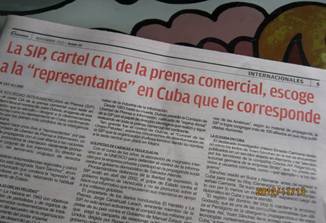 The yellow French-Canadian hack, living in Cuba, who often enjoys ample space in the official press to publish his diatribes, usually dedicated to writing against the Cuban mafia in Miami and against all those who think differently from the official politics, expanded his catalog and undertook to write against Yoani Sanchez.
The yellow French-Canadian hack, living in Cuba, who often enjoys ample space in the official press to publish his diatribes, usually dedicated to writing against the Cuban mafia in Miami and against all those who think differently from the official politics, expanded his catalog and undertook to write against Yoani Sanchez.
In his characteristic offensive and unethical style, something he would not be allowed in Canada but which here, based on his official immunity, he practices, lacking all respect, he applies derogatory epithets and, without even taking into consideration that he’s talking about a woman, shows off all his baseness. It’s terrible to allow a foreigner to offend a Cuban citizen, without anyone overruling him, but here, where politics takes primacy over humanity, these things happen.
I’m not convinced of anything he accuses Yoani of because he provides no evidence, it’s all media speculations, but I know who he works for and who he is paid by. Becoming a hack from this dirty page, he has far exceeded his local prospects, perhaps due to this archaic national complex that whatever comes from the outside is valued more.
I do not buy anything that accuses Yoani because provides no evidence, as are their media speculations, but I know for whom he works and who is paid. Become a dirty hack page, has far exceeded the prospects of the court, perhaps because of this archaic national complex that what comes out is valued more.
In this case, what comes from the outside, is simply bogus.
Translator’s note: The article referred to accuses Yoani, as usual, of being a paid mercenary of the empire (the USA) and being a traitor to her own country. The article was briefly available on Granma’s English language site but seems to have been taken down.
November 13 2012
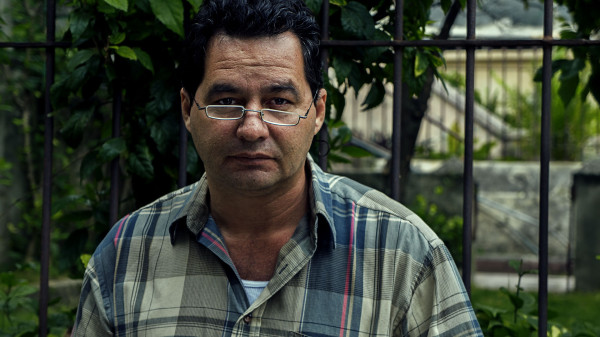
“I’m happy, I’m doing my duty.” #OlaRepresiva #FreeRodiles
Interview filmed by Claudio Fuentes Madan
My name is Angel Santiesteban Prats, I’m a writer and Cuban blogger, government opponent.
It was really sad what happened there, the whole world has seen the terrible video, where unfortunately we show what happens in Cuba every day. Thank God we now have a video to show, these so difficult minutes, but they occur constantly and almost never can we record everything that happens … and worse, for example, the same beating they gave Rodiles, that could not be recorded, if they weren’t already in the street, right now.
When they hit me in the car I really thought I they were going to fracture my skull. I did not think that a person could take some punches as strong as that. And that is why I tried to get out.
At the Santiago de las Vegas station, something unpleasant happened: the official called “Camilo,” according to what he told me, took me to a room and put a gun to my head. I felt the pressure of the metal on the places he’d injured from the blows he’d given me minutes earlier and he said, “To you, what I should do is shoot you in the head.”
They were the longest seconds of my life and I said, I don’t know where I got these words, I really was terrified, terrified at the moment, about how far the madness of these assassins would go, and I said, “At some point you will have to pay me.”
Seconds later he removed the gun and says, “Better, when you go out to the street, we will give you a hammer on the head and say it was an assault, it will be left that it was an assault.” I have understood that they have done this to others, I actually talked to another who was there at the Santiago station and he said they had done the same thing to him.
We are in terrible times, times of anguish. When the tyrant is throwing his final tantrum is when he becomes most dangerous and that’s when it can cost lives.
We are really very concerned with the lives of the activists, the people who are willing to offer themselves, to sacrifice themselves, but in any event we want to take care of them, we don’t want anything to happen to them.
So we want the world to help us, from wherever each person is, his words, his voice is an echo of the pain we feel here. Any person who rises up, to help us and support us, is also struggling in a sense against the dictatorship in Cuba.
Claudio Fuentes: If you could say something to those who beat you …
Ángel Santiesteban: You should know that I don’t hold grudges. I pity them. I feel especially sorry for their families: they are tarnishing the future of their children, their grandchildren, their great-grandchildren, who, embarrassed, will have to accept, “Yes, yes, that was my great grandfather …”
And may they realize what they are doing and when they are given orders to repress, may they do it for themselves, may they save themselves.
Justice does not expire. When you make a mistake, 30, 40 years will pass but you have to pay for that mistake and sooner or later, they will have to pay before justice for all this abuse committed against their people, the citizens, whom they are trampling underfoot and behaving toward as true assassins. They are behaving towards us as true assassins.
Claudio Fuentes: Something you took pleasure in during the time you were arrested, the silver lining…
Ángel Santiesteban: Yes, well, first with Eugenio Leal, we spent the night talking about cinema, literature, art, and Freemasonry and it was a really an enjoyable night. When I got to the dungeon Leal was there, because I had been taken first to hospital, and at his side was was Veizant [Boloy, Yaremis Flores’ husband], and it came straight from my heart and to say to them, “I am honored to be here with you tonight in the dungeons, to share this night with you in this place, it’s an honor for me, I feel it … and well afterwards, with Claudio, with you, that went super well.
I think they suffered to see us laughing. And just talking about literature, we talked about cinema, photography … and really it’s where you feel most human, where you feel a deep affection for your companions.
None of us thought of ourselves there, we were actually thinking of Yoani, of everyone, of Veizant’s wife, of [Antonio] Rodiles, we thought of them. If we would have said “we are already free” we would have passed the time a lot better, but we were really concerned about the fate and suffering of these people.
We knew what they had done to Antonio Rodiles and that made us suffer greatly, we did not know his fate. Remember that they took us from the street, from the monument there, that was a perfect place for them to massacre us and leave us there, shot, that is what I fear will eventually happen.
And their destinations unknown, they took Yoani, we did not know what her fate would, also at that time they had taken you to another place, and we feared they were beating you, that you were suffering.
But honestly if we knew at that moment that we were free, we would have felt better, despite the body aches we all had, I think the best, I admit it, is the glow I feel in having been a part of it, like in the 19th century, as if we were seated in Guaimaro*, the height of all this great history that we Cubans have.
To be there, there’s no other way, for me I am proud to be fighting for the people of Cuba, for my family, for myself, for the future of this country that deserves, starting now, to have a brilliant destiny, a destiny of peace. We’ve had more than a century of supposed democracy and that hasn’t happened: we have suffered, we are constantly suffering.
Claudio: Finally, I would like you to repeat some words you sent your wife from in there, you managed to get out, “Tell her that I’m happy here, because I’m doing what my heart and my conscience ask of me.”
Ángel Santiesteban: Yes, and they told her! When I was there, my wife was up at the station and I ordered them to tell her I sent her a kiss and to tell her how I was… And it came out of my soul and I said to the officer, “Tell her I’m happy, that I am in the place my heart has brought me to, that I am very well here. That she should go and rest and not worry herself, that I am doing my duty.”
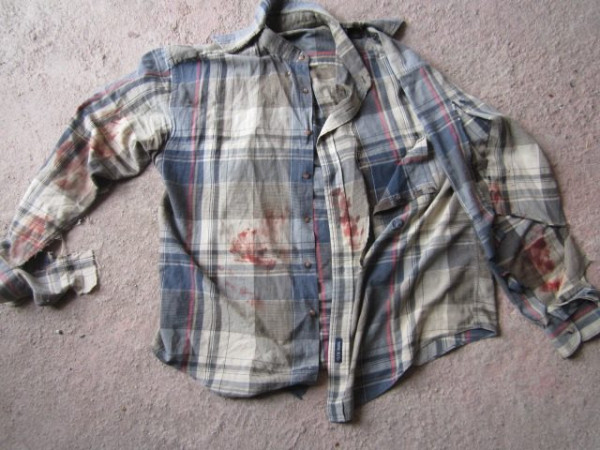
*Translator’s note: Guáimaro is the place in Cuba where the Revolutionary Army of Mambises met in 1869 and created the Constitution for a new nation free from Spanish colonial oppression.
Source of interview text: tweetymail.com/users/PorOtraCuba [For Another Cuba]
13 November 2012
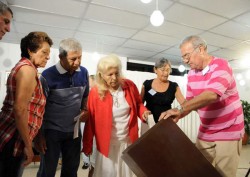
The results of the ballots –the so-called “elections”- in Cuba this past October 21st were reported in the official media as a demonstration of the people’s loyalty to the Revolution, which is to say, an example of allegiance to the government. Nothing new in that discourse. Every two and a half years, there is a repetition of the choreography in which government and “voters” play their role in the comedy, pretending to do their part: the former, holding elections, the latter, making choices.
Although this time the process featured more apathy than usual on the part of the voters, and the authorities were less irksome with propaganda, and even stopped the usual practice of niggling voters by sending Pioneers to insistently knock on doors of the most unlikely to go out and cast their votes, attendance figures again placed above 90%, as befits any self-respecting totalitarian regime. However, even if we gave credence to the official data, the number of dissenters was clearly endorsed at 1,161,431 Cubans of voting age who did not go to the polls, invalidated their ballots, or left them blank, three sufficiently clear ways to at least protest the lack of confidence in the system by a significant number of the population.
At any rate, the fear of retaliation and the zombie effect continue to be the norm in the population. A few days after the elections, I decided to make inquiries among voters in some neighborhoods of three of the more densely populated municipalities in the capital: Cerro, Diez de Octubre, and Centro Habana. Knowing how impossible it would be to organize a formal and complete survey, I thought it more expeditious to assume the position of a fellow citizen innocently seeking information needed for a personal matter, and to improvise, according to the situation. My objective was to confirm what we all know, including voters who vote in an effective manner, that is, those individuals whose ballots are valid upon scrutiny, because they vote for only one of the candidates for delegate districts, they do so automatically. Even so, most of those who consider themselves party to the system ignore even the most basic information of their “elected”.
Thus, I showed up randomly in 46 different blocks of said municipalities, sometimes knocking on doors where an always rickety sign declared it to be the headquarters for the CDR; others, I would turn to any civilian strolling around the area or simply taking in the sights on his doorstep. In total, my questions were very basic, and, as I said before, I modified them whenever appropriate:
Only one housewife could give me a half-answer for the first question, because the delegate lived in her building, though she didn’t know where or when he held office hours. The rest, people would tell me they did vote –except in one case, when an individual answered, with some suspicion, that he was away on that day, and he wasn’t very communicative- though nobody could tell me with any certainty the name of their delegate, let alone his address or how to get in touch with him. Only three individuals told me that the candidate they voted for had been elected, but couldn’t quite remember his information (last names, address, etc.) “I think his name was Juan Luis or something like that”, “I think he lives in the green building around the corner” were some of the most accurate information I found. Other descriptions were even ambiguous: “He is military, bald-headed”, “Yes, of course, he’s a mulatto who hobbles a bit when he walks, but I don’t remember his name or where he lives.” As can be seen, people have a high political sense and a close bond with their representatives, as proclaimed in the official media.
As far as my many relatives and friends, close or not-so-close, the pattern was of similar behavior, though, of course, no one was reluctant to answer. Only one person admits voting for a delegate (a valid ballot), though he has no idea of his name or who the guy is. The rest voided their ballot with “D” or crossed it out. A smaller group and I did not go to the polls.
Certainly, my little “survey” is not worth any official purpose, but I invite any Cuban to verify for himself the truth in what I say. One does not have to be very sharp in his questionnaire. Any question about what led an individual to vote for one or another of the candidates, or about the nature of his expectations will immediately raise suspicions on the part of the surveyed and will only produce evasive answers. We have had over 5 decades of fear, and a lot of people still seem to sense a guardian dog of the regime behind any other Cuban. But they will be able to see without doubt that the official discourse stands on a scaffold so fragile that it would not withstand even the simplest poll of any agency qualified for such purposes.
Of course, a makeshift Cuban pollster would also run the risk of approaching the wrong person. He could stumble onto the most zealous “combatant” on the block, the one who sees “the enemy” behind the most innocuous question, and then the person conducting the survey might spend a night in a dungeon and get out after signing a “memorandum of warning “as punishment. I must confess that I’ve been lucky, or maybe the snitches and the Talibans are waning. I don’t know. That would be another kind of survey, that, I have to admit, I still don’t dare to perform.
Translated by Norma Whiting
November 5 2012
Away from the capital and without any contact with the Christian Liberation Movement I thank God who made use of small signs of liberty that came to me from here and there in order to guide me in the middle of the sad and confused Cuban reality. Even in reading from a book as poisonous as “The Dissidents” I realized where good and evil were really found.
Maybe the most significant and influential for me have been the so-called spiritual leaders in exile, Cuban pastors and priests who in Miami, and beyond religious differences, kept very alive their love of Cuba and shared it like a fire in periodic prayer meetings and through joint projects and whose news and messages arrived at the island through radio programs like those conducted by Francisco Santana such as “The Cuban and His Faith” or “Cuba, Your Hope,” or Lenier Gallardo, pastor of the Lutheran Church “Prince of Peace” in spaces like “Yesterday, Today and Forever” or in his classic Sermon of the Seven Words each holy week.
As part of that faith group and representing the Baptists was Marcos Antonio Ramos, very influential as pastor and intellectual in exile and of great reputation among Cuban Baptists. They not only defended the validity of the Varela Project in exile, in the middle of many instances of misunderstanding and confusion but also in an indirect way and thanks to the broadcasting helped to inform many like me on the island.
Whatever happens from here on I will be eternally satisfied that I will not be able to say that they did not knock on my door, and when they knocked I accepted the challenge: I am a signatory of the Varela Project and I refused to endorse the reform of the Constitution that declared the irrevocable character of socialism in Cuba, a clumsy reaction of the regime before the mastery of Paya, celebrated by Carter in his visit to the island as well as various figures from around the world.
The correctness of my citizen decisions I owe in great part to the influence that notwithstanding such obstacles came to me from one Paya with whom I never had the honor of shaking hands, but from whom I always had the joy of finding myself spiritually near, and now more. The arguments that were heard from this brave man, opposing all the useless indoctrination of the regime’s propaganda to which I was exposed during all the years of my childhood, adolescence and early adulthood, made me react to the reality that I had a right to rights, and with me my fellow man, the totality of my fellow citizens, with all and for the good of all.
Translated by mlk
November 1 2012
 Sometimes when I’m restless I dream that I move, that I change houses over and over without being able to enjoy any of them. In this recurring nightmare, my life is dismantled and my childhood photos are lost in some moving van. But this only happens to me on nights of midlevel anxiety. This week, for example, has been different. The wee hours find me walking on an endless dark road. I put my head on the pillow and return to this trail surrounded by high grass, with the sound of cicadas boring holes in my ears. I’m not alone, at my side are familiar faces: my friends of laughter and dungeons, of hugs and terrors. We talk and the phrases are cut in half because they disappear into the weeds, they go… they take them. Every night I no more close my eyes than the bushes return to swallow my loved ones.
Sometimes when I’m restless I dream that I move, that I change houses over and over without being able to enjoy any of them. In this recurring nightmare, my life is dismantled and my childhood photos are lost in some moving van. But this only happens to me on nights of midlevel anxiety. This week, for example, has been different. The wee hours find me walking on an endless dark road. I put my head on the pillow and return to this trail surrounded by high grass, with the sound of cicadas boring holes in my ears. I’m not alone, at my side are familiar faces: my friends of laughter and dungeons, of hugs and terrors. We talk and the phrases are cut in half because they disappear into the weeds, they go… they take them. Every night I no more close my eyes than the bushes return to swallow my loved ones.
I get up in the morning and tell myself, “It’s all over, it was just a dream.” But after a while the phone rings and someone tells me that Antonio Rodiles remains in custody, accused of resisting an arrest as arbitrary as it was unjust. I go to the bathroom, my eyelids still half open and realize that just a few hours ago Angel Santiesteban had been released after they forced him into a police car with blows. The morning coffee percolates on the stove and I check my cellphone, full of denunciations of the abuse of the Ladies in White in several areas of the country. The light still has the red hue of dawn and I already feel that the long road retraced in my dreams extends into reality.
It’s not the weeds, but the intolerance; not the song of the cicadas but the shouts of the authoritarians; not the night but the lack of freedom. Because when noon comes I’ve already found I can’t escape them, pinching my forearms or even putting my head under cold water doesn’t work. It’s a fact that those “abducted” friends are a concrete reality, tangible, not a nocturnal delirium. The afternoon advances and I understand that my nightmare is all around me and I end up returning to the trail surrounded by high grass. But this time there is only me, talking to myself so the darkness won’t scare me to death. Someone – I don’t see who – grabs me and shoves me into the weeds. It’s three hours before the alarm goes off and I wake up.
12 November 2012
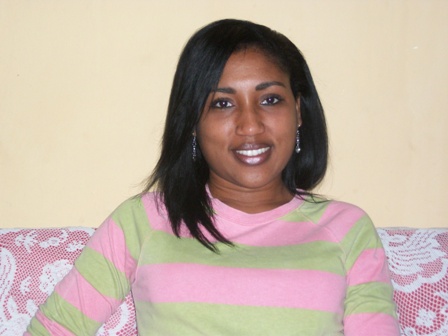
By Yaremis Flores
The afternoon of November 7th I couldn’t imagine that I’d trade my name for a number. I went out at approximately two in the afternoon to take a serving of soup over to my father, who’d been admitted into a hospital. While I was going down the street I live on, the #950 patrol was driving slowly around the area. When I was almost crossing the road, I heard a sharp braking. An agent from State Security called me by my name and said the usual: “You have to come with us and turn off your cell phone.”
I had made the made the call to which I have a natural right and no one can deny me beforehand. Thus I at least was able to report my arrest. Because of my short height, the fact that I’m a woman and unarmed, I didn’t deserve the corpulence of badge numbers 29128 and 29130, by whom I was taken to the back seat of the patrol car without knowing the reason for nor the place of my destination. When I asked, the agent limited himself to saying “you’ll see where we take you, I felt like meeting you, but today you’re going to find out who I am.”
My surprise wasn’t much at seeing my destination was 100 and Aldabó. I’ll confess I thought at first it would only be a few hours’ detention. Under the pretext of spreading false news against international peace, they took blood samples from me and seized all my belongings. An officer told me that I must read a sign on which are listed the rights and responsibilities of detainees, as if they were worth much. Then I was led into a small room where they gave me a gray uniform and told me to always carry my hands behind my back: so that I’d not be reprimanded!
They gave me two sheets, a blanket, a towel and a mattress pad. I forget who, but someone said “she will spend a few days here.” During more than three hours of questioning, the case officer tried to deciphermy thinking and collaboration with Cubanet. He sought an explanation of whathis superiors classified as a process of metamorphosis: “from a judge to a counterrevolutionary.” Making it clear that that would not be our only conversation, an officer took me to a cell with two other prisoners, who had been there more than 30 days.
Many worries came to mind: my father’s health, my little 3 year-old girl, and the reaction of my husband, friends, and family. I showed calm. That night I ate nothing. I tried to sleep. When I almost succeeded, some blows to the cell bars and the jailer’s shouts startled me. “54033, 54033!!!” I didn’t answer. When she opened the cell, the bitter woman looked at me and said “Girl, you don’t hear me calling you, or they gave you a beating with gusto.”
Then I remembered that I had in a small blouse pocket a little piece of cardboard that said “54033/201.” It meant my prisoner number and my cell number. One of the girls told me “now this is your identity card.” Meanwhile, the jailer told me to get all my things together. A little dazed, I began to fasten my shoes and she warned me: don’t fix up so much, you’re not going very far, you’re going to another cell. “Then I’m going to another cell,” I answered. This was my first night in Aldabó.
Translated by: JT
November 12 2012